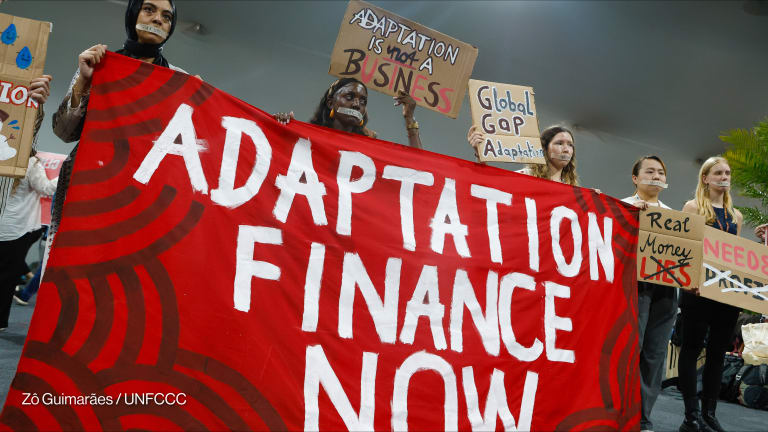
The 2021 Climate Convention in Glasgow came at a critical time, with the world recovering from the ravaging COVID-19 pandemic — and a threatening rise in global warming.
As the summit started at the end of October, global temperatures were already ranging between 1.1 and 1.2 degrees Celsius above pre-industrial levels. This means we’re dangerously close to the 2-degree Celsius threshold identified by scientists and the Intergovernmental Panel on Climate Change. In such a scenario, heat extremes will reach critical tolerance thresholds for both agriculture and health.
The Pro read:
Though climate financing data isn’t easy to track, we dug into available donor funding data from OECD and analyzed it using Donor Tracker to find the top climate donors.
For example, longer dry spells mean reduced agriculture yields and increased incidents of pests and diseases that not only harm plants, but humans as well. Other consequences include more prevalent droughts and floods, as well as increased sea level rises and cyclones, as recently seen in Mozambique.
COP 26 presented a crucial opportunity for world leaders to make the urgent resolutions needed to contain global warming temperatures under the 1.5 degrees C established by the 2015 Paris Agreement.
As the summit came to a close, many of us in low- and middle-income countries have been digging through the Glasgow Climate Pact to understand what the commitments made actually mean for us — individually and as a collective.
In addition to the pact, the climate summit included critical pledges and promises around halting deforestation and increasing financial flows to help us, as a collective, get going on our adaptation agendas.
This year, unlike previously, agriculture and food systems were discussed in the negotiations. Even though these issues did not make it into the final, agreed text, it’s an important step in future negotiations and actions for a just transition of our food systems.
Increasing financing for adaptation
Adaptation and resilience remain high on the list of priorities for Africa’s climate and development agenda. As in previous COPs, finance for adaptation continued to be a key discussion point for African countries.
At the 2009 COP in Copenhagen, high-income countries promised to channel $100 billion a year to less wealthy nations by 2020 to help them adapt to climate change. Yet, these pledges have yet to be met — reaching only $80 billion in 2019.
In this regard, the Glasgow Pact made significant inroads in resolving this shortfall with an unprecedented target to double the funding to be provided to LMICs for adaptation by 2025. Even though this represents a huge boost for adaptation, it still falls short of the $100 billion target.
For Africa, this means we need to continue to mobilize financing from domestic resources and create innovative financing vehicles that will attract private money for adaptation. One example is the issuance of green bonds that can help mobilize funding for adaptation and resilience.
The continent has the human and natural resources needed to slow-down and reverse climate warming. All it takes now is for the continent’s leaders to seize the moment and lead the way.
—We have seen that such innovative financing mechanisms can work if we de-risk our financial and economic systems to attract private investments. Other financing possibilities lie in innovations such as carbon trading taxes and the creation of a “loss and damage” fund for high-income countries to “compensate” less wealthy countries for being the main historical drivers of climate change.
Africa, and other LMICs, need to keep these discussions alive to ensure a better deal in future negotiations. This means keeping this agenda alive in individual countries, and at regional and continental levels.
Restoration key for meeting climate goals
Even though COP 26 did not lead to a global goal on adaptation, some progress was made with the launch of the two-year Glasgow-Sharm el-Sheik work programme on adaptation. Delegates also recognized the critical role that the restoration of nature plays in the adaptation agenda.
For Africa, agricultural activities take center stage in operationalizing key agreements in the pact. A deliberate focus on nature stewardship and restoration is crucial for meeting the continent’s development aspirations, and its ability to cope with and survive the climate crisis.
Through these renewed and increased commitments to adaptation, there is a great opportunity for sustained recovery and growth through nature, and particularly for soil, restoration, and conservation.
Africa recognizes that the transformation to sustainable and regenerative agriculture requires integrated and cross-sectoral investments in agriculture and others such as public education, new technologies, and health. The Glasgow Pact and other commitments are an indication of a positive trend that we need to capitalize on to maintain the momentum we have created.
Africa leading the way
To us, the cost of inaction has far reaching and unforgiving consequences. We need to seize this moment in history, and use the increased commitments to adaptation to drive and attract further investments for building a resilient and people-centered food system that will drive development across the continent. We need bold leadership that demands inclusiveness, the effective implementation of policies and programs, as well as transparency and accountability.
Africa can no longer remain a bystander in the fight against climate change. The continent must lead in developing its own capacities to cope with climate change, and invest in its ecological assets by utilizing the scientific knowledge that is now available.
As the common saying goes, “never let a good crisis go to waste” — and this is indeed the perfect time for Africa to show leadership. The continent has the human and natural resources needed to slow-down and reverse climate warming. All it takes now is for the continent’s leaders to seize the moment and lead the way.








